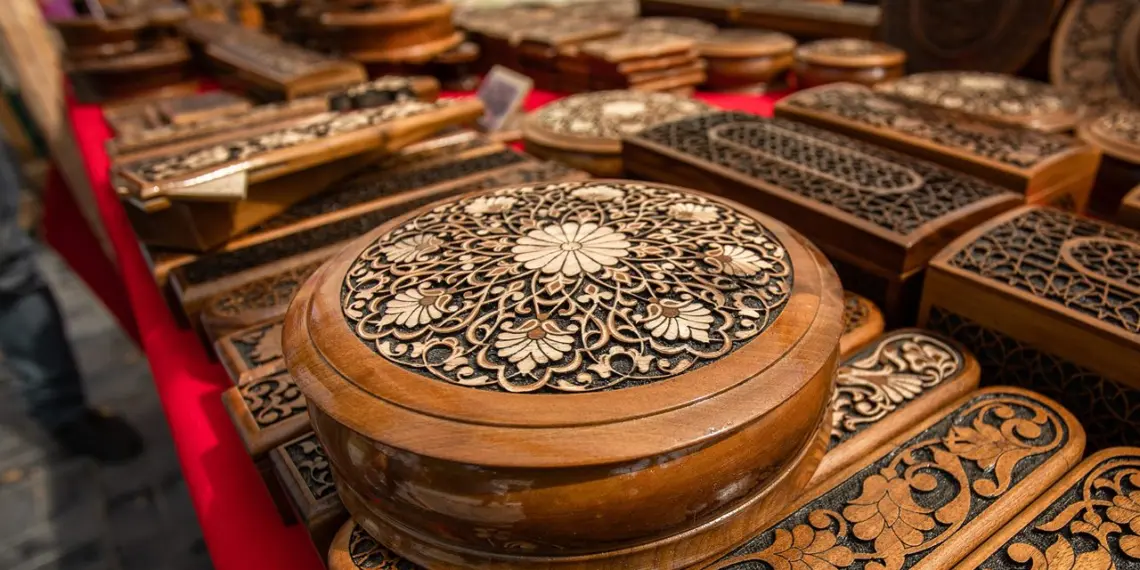Walnut wood has long been revered for its rich colour, intricate grain patterns and durability. From ancient to modern times, artisans and craftsmen have recognised walnut wood as an exceptional material for creating beautiful artefacts. This essay explores the history, characteristics and contemporary relevance of walnut wood artefacts, illustrating their significance in functional and decorative realms.
The use of walnut wood dates back thousands of years. Its origins can be traced to the regions of Persia and the Mediterranean where the ancient Greeks and Romans first utilised it for furniture and ornamental objects. Walnut trees thrive in temperate climates, making them widely available across Europe and North America which contributed to the wood’s popularity among early settlers and craftsmen. In Europe, walnut wood became synonymous with luxury and craftsmanship during the Renaissance period. It was used to create elaborate furniture, intricately carved frames and decorative boxes. The exquisite detailing found in these artefacts reflected the skill of the artisans and the wealth of their patrons. As a result, walnut wood furniture often became family heirlooms, passed down through generations, further embedding these artefacts into the cultural fabric of societies.
Walnut wood possesses unique characteristics that make it highly desirable for crafting artefacts. One of its most striking features is its rich, deep brown colour interspersed with lighter streaks which gives each piece a distinctive appearance. The wood’s natural lustre enhances its visual appeal when polished, it can be almost silky. Walnut wood is known for its strength and stability. Unlike softer woods that may warp or bend over time, walnut maintains its shape and integrity, making it an excellent choice for functional and decorative items. The wood’s density also provides excellent sound absorption properties, making it a favoured material for instruments like pianos and guitars. Another advantage of walnut wood is its workability. Craftsmen find it relatively easy to carve and shape, allowing for intricate designs that elevate the aesthetic of any artefact. This versatility enables the creation of a wide array of products from fine furniture to kitchenware and even sculptures.
The allure of walnut wood artefacts has not faded, rather, it has evolved to adapt to modern tastes and needs. As sustainability becomes increasingly important, many consumers seek natural materials that connect to nature. Walnut wood fits this niche perfectly, offering a blend of beauty, functionality and eco-friendliness. Craftsmen today utilise walnut wood to create various products that appeal to contemporary aesthetics. Minimalist design trends have become popular and rustic walnut wood products align seamlessly with this movement. Whether it’s a handcrafted cutting board, elegant furniture or decorative wall art, walnut artefacts bring warmth and character to homes, making them beloved by many. Furthermore, the rise of artisanal approaches to crafting has spurred interest in handmade walnut wood artefacts. Consumers are increasingly drawn to products that reflect individuality and craftsmanship over mass-produced items. Artisans who work with walnut wood often emphasise traditional methods, creating pieces that showcase the wood’s unique qualities while telling a story of heritage and skill.
Beyond their physical attributes, walnut wood artefacts hold cultural significance in various communities. In some cultures, gifting wooden items symbolises strength and longevity, making walnut artefacts popular choices for weddings and anniversaries. Giving such gifts reflects the giver’s intent to convey love and appreciation, suggesting that the recipient will cherish the item for years. Additionally, walnut wood’s connection to craftsmanship serves as a reminder of the importance of artisanal trades in preserving cultural heritage. As techniques are passed down through generations, they foster a sense of identity and continuity within communities. The artisans’ commitment to using local materials and traditional methods enhances the value of walnut wood artefacts, linking the present with the past.
Walnut wood artefacts are more than just functional items, they embody a rich history, showcase unique characteristics and represent cultural values that resonate with people across generations. Their timeless appeal lies in the harmonious balance of aesthetics and practicality, making them cherished possessions and symbols of craftsmanship. As society continues to embrace sustainability and artisanal practices, the allure of walnut wood artefacts will endure, carrying with it the stories and traditions of those who shaped them.


